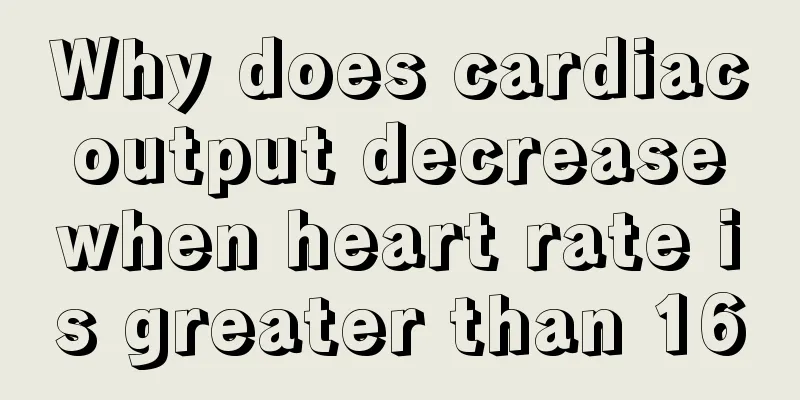Why does cardiac output decrease when heart rate is greater than 160

|
The heart relies on expansion and contraction to exert force on the blood, allowing blood to flow throughout the body, and this contraction and expansion is called heartbeat. The heart's beating pattern is relatively constant, within a certain safe range, usually calculated in minutes. A heart rate that is too fast is very bad for your health. For example, why does cardiac output decrease when the heart rate is greater than 160? Let’s take a look at the explanation below. Cardiac output is the product of stroke volume and heart rate. As the heart rate increases, cardiac output increases, but there is a certain limit. For example, if the heart rate is >170 beats/min, the ventricular filling time is significantly shortened, the filling volume is reduced, the stroke volume is reduced to about 50% of the normal level, and the cardiac output decreases. If the heart rate is too slow, <40 beats/min, the cardiac output also decreases. This is because the heart's diastole is too long, and the ventricular filling has already reached its limit. Prolonging the diastole time will not increase the stroke volume accordingly. If the heart rate is too fast or too slow, cardiac output will be reduced. The amount of blood pumped out by the heart per minute decreases, which may be due to the following reasons: 1. Decreased ejection, insufficient blood supply, and increased peripheral resistance. 2. Myocardial preload. and ventricular end-diastolic volume, 3. Myocardial afterload and arterial blood pressure. 4. Myocardial contractility. 5. The specific reason for the heart rate change can be explained as follows: When the heart rate exceeds 180, the diastole is significantly shortened, resulting in insufficient ventricular filling with blood, which causes the stroke volume to decrease and the cardiac output to decrease. People of different ages have different heart rates. The younger the age, the faster the heart rate. If the heart rate exceeds the normal range, it is called a tachycardia. The accelerated heart rate caused by illness is most common when you have a fever. For every 1°C increase in body temperature, the heart rate can increase by 10 to 15 beats per minute. Therefore, diseases that can cause fever will often result in an accelerated heart rate, but typhoid patients are an exception. The pulse of typhoid patients is relatively slow, which is called a relatively slow pulse. This is an important characteristic of typhoid. If your heart rate continues to be too fast, you should consult a doctor. The normal pulse rate of an adult at rest is 60-100 beats per minute, which may vary with factors such as age, gender, labor and mood. Generally, women speed up faster than men, young children speed up faster than adults, and the elderly speed up slower. It may speed up temporarily during exercise or emotional excitement, and slow down during rest and sleep. |
<<: What to do if the heart rate is too fast due to anemia
>>: The impact of jogging on heart rate
Recommend
Pain where your waist and buttocks meet?
Modern people are usually under a lot of pressure...
How to treat brain cancer in the early stage by yourself
Since the above situation is relatively simple an...
Is it better to apply hot or cold compress to glasses
Whether to apply hot or cold compress to the eyes...
How long is the shelf life of nail polish?
In life, there are many women who love beauty ver...
Swollen gums cause half of my face to swell, what's going on?
People say that toothache is not a disease, but i...
Nasopharyngeal cancer self-test in 30 seconds
There is no 30-second self-diagnosis method for n...
What to do if hip fibroids swell
Gluteal fibroma is a fibromatosis that occurs in ...
Using mosquito coils to repel mosquitoes in summer is very harmful! Light this thing and the mosquitoes will disappear without a trace
With the arrival of summer, there are more mosqui...
How to make dried fruits in the oven
Fruits contain very high levels of vitamins. Eati...
The consequences of being angry and crying during pregnancy
Pregnant women should try to keep a stable mood d...
How many calories does a shower consume?
In order to lose weight, we often calculate the c...
Why is my waist sore?
After a tiring day, many people will experience b...
Let me tell you in detail about the early symptoms of melanoma
Early treatment of melanoma is very important. Wh...
Does drinking alcohol have any effect when you are pregnant?
Drinking when you are just pregnant will have a c...
What is the reason for frequent high fever
I believe that everyone is familiar with the symp...









